Some days, fishing is easy. Willing trout come readily to hand, unable to resist the bugs danced across the water with a fly rod.
Some days, it's labor. It can be fruitless, or it can be rewarding, but work is involved. Sometimes a lot of work.
As I stood atop the Wabasha County Road 7 bridge over southeast Minnesota's Zumbro River some years back, I had a feeling I was in for a little work. The river, a budding smallmouth stream north of Rochester, teemed with life. From my elevated vantage point, I could see dozens of large suckers in full spawn mode — everywhere I looked, the bottom-feeders occupied holding water where I might have expected to find bass. Big, pale sulphur duns hovered above the clear water, and mud swallows cartwheeled about, plucking up the tasty mayflies in mid-flight. Now and then, in the froggy water just upstream of the bridge, I'd see some nervous ripples and an occasional rise. Bass? Maybe. But northern pike and muskie also lurk in the river's nooks and crannies.
I've developed an affinity for smallies, particularly in moving water, where they behave a bit like trout, only with an attitude. They're burly fighters — even the smaller ones — and they can be hot and cold, just like their coldwater cousins. On a 6-weight rod, a foot-long smallmouth is serious entertainment.
But first, you have to convince them to eat. On a day like this one, with suckers busy up and down the river, getting the smallmouth to come out and play would be no easy task. But like any work worth doing, the payoff is significant.
I started with a crawfish pattern — mostly because, as I stepped into the tepid water upstream from the bridge, I noticed a handful of the crustaceans tailing away from my footfalls. I cast the weighted fly into likely holding areas, stripping it erratically in hopes of imitating a panicked crawdad desperately seeking safety. I hit the riffle. I hit the slick just below it. I even rolled the big fly across the river and let it swing. Nothing.
I'm not an experienced smallmouth angler — we have bass here in Idaho, but they're in big, sweeping water, and I'm guilty of not taking the time to chase them very often, given the trout that thrive near home. It's a mistake I need to rectify. Eventually.
But in southern Minnesota, smallmouth have pushed their way into the cool waters of rivers like the Zumbro and the Root, and they've gained a devoted following of fly anglers, many of whom navigate these charming rural water trails in canoes or john boats, casting as they drift. I picked a few brains, but information was a bit scarce (or closely guarded).
So, like any devoted trout fisherman, I stopped and watched the river. The suckers continued with their spawn, loath to even move out from underfoot as I walked up knee-deep run trying to see if I was scaring any bass out from behind rocks. The air was heavy with the promise of a shower or two later in the day, and the leafy maples lining the river resonated with bird songs. Now and again, as I noticed before, a fish would break the surface in the flat water.
Popper time.
I tied on a fly I'd commandeered from a guide in northwest Wisconsin. Bright yellow, with glued-on eyes and an orange deer-hair tail, this attractor was deeply foreign to the dry-fly angler who's more interested in getting the right drift than he is about "popping" foam flies across the top of the water. But in minutes, I came to understand why they make poppers in the first place.
They work.
Standing below a quick run, I cast the yellow bug into the slack water created by a small eddy. Two stips later, I watched as the popper bounced the from the water thanks to a push from a small bass. I never felt the fish, but the take startled me into lifting the rod, much like I might for a trout. No fish, but promise.
I cast again. Another hit. I was beginning to like my chances.
I soon realized, however, that smallmouth fishing in conditions like this, when there's a lot happening in the river, is a blind endeavor. They're either there, or they're not. And whether they'll eat ... that's a whole new dilemma. I found some water similar to that first eddy where the popper drew some interest, but no luck. I continued to move, navigating my way up the river, looking for likely water. Occasionally, I'd draw a strike, but I couldn't banish the trout habits long enough to keep from instinctively pulling the fly right out of the mouths of a handful of bass.
It was quickly becoming work.
Finally, a couple hours into the excursion, and after a long cast across a vast, deep slick, I hooked my first Zumbro River smallie. It was nothing to write home about, but the long retrieve across the water got my blood moving, and I gratefully tugged the small bass into the shallows. Deep green and full of life, the little bass zipped back into the river once I let it loose.
Labor's rewards. Worth every minute.




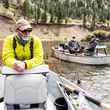
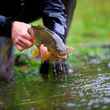

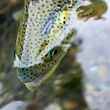
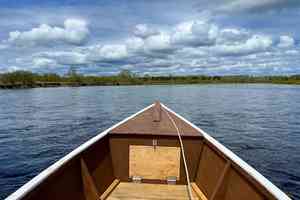


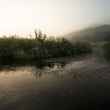




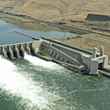
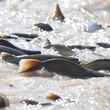



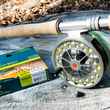
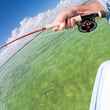




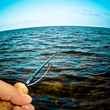
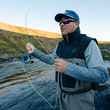
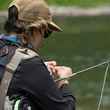

Comments